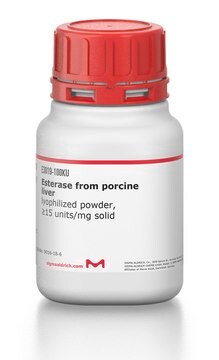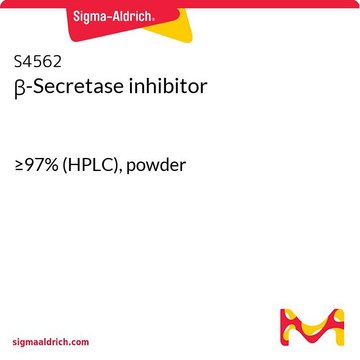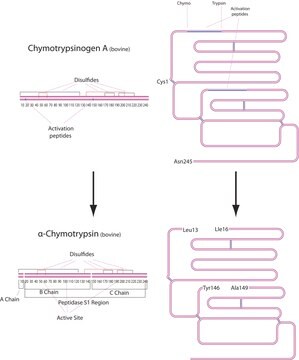C8118
Chymase human
recombinant, expressed in Pichia pastoris
Sinónimos:
Mast cell protease I
Iniciar sesiónpara Ver la Fijación de precios por contrato y de la organización
About This Item
Número de CAS:
MDL number:
UNSPSC Code:
12352204
NACRES:
NA.54
Productos recomendados
recombinant
expressed in Pichia pastoris
Quality Level
form
liquid
specific activity
≥40 units/mg protein
mol wt
~37 kDa by SDS-PAGE
concentration
125-400 μg/mL
UniProt accession no.
application(s)
diagnostic assay manufacturing
shipped in
dry ice
storage temp.
−20°C
Gene Information
human ... CMA1(1215)
¿Está buscando productos similares? Visita Guía de comparación de productos
Categorías relacionadas
Application
Human chymase has been used in a study to assess the effects of Panax notoginseng flower extract on the TGF-β/Smad signal transduction pathway in heart remodeling. Human chymase has also been used in a study to investigate the blood glucose level and survival in streptozotocin-treated human chymase transgenic mice.
Chymase has been implicated in generation of angiotensin II and cleavage of big endothelin. Studies indicate it may be involved in vascular proliferation, myocardial infarction and dermatitis.
Biochem/physiol Actions
The enzyme rapidly converts angiotensin I to angiotensin II. Optimum pH for the enzyme activity is between 7.5 and 9.0. Enzyme activity is inhibited by soybean trypsin inhibitor, phenylmethylsulfonyl fluoride and chymostatin.
Physical properties
Chymase is a cathepsin G-like, S1 serine proteinase found primarily in mast cells. It has a molecular mass of ~30 kDa, however its apparent molecular mass on SDS-PAGE is around 37 kDa.
Unit Definition
One unit hydrolyzes one micromole of N-benzoyl-L-tyrosine ethyl ester (BTEE) per minute at pH 7.8 and 25 °C. The assay buffer used to determine the enzyme activity contains 27 mM Tris-HCl, pH 7.8, with 150 mM NaCl and 0.43 mM BTEE.
Physical form
Supplied as a solution in 20 mM Tris, 0.8 M NaCl and 25% glycerol, pH 7.6
Storage Class
10 - Combustible liquids
wgk_germany
WGK 1
flash_point_f
Not applicable
flash_point_c
Not applicable
ppe
Eyeshields, Gloves, multi-purpose combination respirator cartridge (US)
Elija entre una de las versiones más recientes:
¿Ya tiene este producto?
Encuentre la documentación para los productos que ha comprado recientemente en la Biblioteca de documentos.
Ananya Roy et al.
The Journal of biological chemistry, 289(1), 237-250 (2013-11-22)
During infection and tissue damage, virulence factors and alarmins are pro-inflammatory and induce activation of various immune cells including macrophages and mast cells (MCs). Activated MCs instantly release preformed inflammatory mediators, including several proteases. The chymase mouse mast cell protease
Devandir Antonio de Souza et al.
PloS one, 7(7), e40790-e40790 (2012-07-21)
Tumor cells are surrounded by infiltrating inflammatory cells, such as lymphocytes, neutrophils, macrophages, and mast cells. A body of evidence indicates that mast cells are associated with various types of tumors. Although role of mast cells can be directly related
Jacco J de Haan et al.
American journal of physiology. Gastrointestinal and liver physiology, 305(5), G383-G391 (2013-07-03)
Nutritional stimulation of the cholecystokinin-1 receptor (CCK-1R) and nicotinic acetylcholine receptor (nAChR)-mediated vagal reflex was shown to reduce inflammation and preserve intestinal integrity. Mast cells are important early effectors of the innate immune response; therefore modulation of mucosal mast cells
S Takai et al.
Clinica chimica acta; international journal of clinical chemistry, 265(1), 13-20 (1997-11-14)
A chymostatin-sensitive angiotensin II-generating enzyme was found in human gastroepiploic arteries. The enzyme was purified using heparin affinity and gel filtration columns. The molecular mass of the purified enzyme was 30 kDa, and the optimum pH was between 7.5 and
Su Duy Nguyen et al.
Journal of lipid research, 53(10), 2115-2125 (2012-08-03)
HDL particles may enter atherosclerotic lesions having an acidic intimal fluid. Therefore, we investigated whether acidic pH would affect their structural and functional properties. For this purpose, HDL(2) and HDL(3) subfractions were incubated for various periods of time at different
Nuestro equipo de científicos tiene experiencia en todas las áreas de investigación: Ciencias de la vida, Ciencia de los materiales, Síntesis química, Cromatografía, Analítica y muchas otras.
Póngase en contacto con el Servicio técnico







